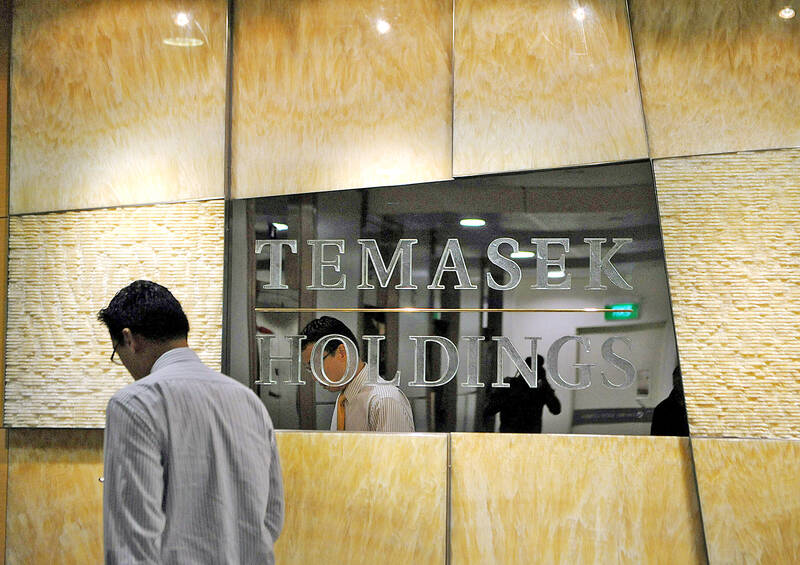Singapore state investment fund Temasek Holdings Pte yesterday said that it had slashed compensation for the team and senior management responsible for its investment in collapsed cryptocurrency exchange FTX.
FTX and its sister trading house Alameda Research went bankrupt in November last year, dissolving a virtual trading business that at one point had been valued at US$32 billion.
Prosecutors allege that then-FTX chief executive Sam Bankman-Fried cheated investors and misused funds that belonged to FTX and Alameda Research customers.

Photo: AFP
Bankman-Fried has pleaded not guilty to all charges and is due to go on trial in New York in October.
Temasek wrote down US$275 million of investments in FTX and launched an internal review.
“Although there was no misconduct by the investment team in reaching their investment recommendation, the investment team and senior management, who are ultimately responsible for investment decisions made, took collective accountability and had their compensation reduced,” Temasek chairman Lim Boon Heng (林文興) said in a statement on the company’s Web site.
He did not give details.
Temasek said it invested in new sectors and emerging technologies to better understand how they could affect its existing portfolios and drive future growth.
“With FTX, as alleged by prosecutors and as admitted by key executives at FTX and its affiliates, there was fraudulent conduct intentionally hidden from investors, including Temasek,” the statement said. “Nevertheless, we are disappointed with the outcome of our investment, and the negative impact on our reputation.”
Temasek said it had invested US$210 million in FTX International and US$65 million in FTX (US), across two funding rounds from October 2021 to January last year.
The cost of the investment was 0.09 percent of its net portfolio valued at S$403 billion (US$297.9 billion) as of March 31 last year, the end of its financial year, the fund said.

Semiconductor business between Taiwan and the US is a “win-win” model for both sides given the high level of complementarity, the government said yesterday responding to tariff threats from US President Donald Trump. Home to the world’s largest contract chipmaker, Taiwan Semiconductor Manufacturing Co (TSMC, 台積電), Taiwan is a key link in the global technology supply chain for companies such as Apple Inc and Nvidia Corp. Trump said on Monday he plans to impose tariffs on imported chips, pharmaceuticals and steel in an effort to get the producers to make them in the US. “Taiwan and the US semiconductor and other technology industries

SMALL AND EFFICIENT: The Chinese AI app’s initial success has spurred worries in the US that its tech giants’ massive AI spending needs re-evaluation, a market strategist said Chinese artificial intelligence (AI) start-up DeepSeek’s (深度求索) eponymous AI assistant rocketed to the top of Apple Inc’s iPhone download charts, stirring doubts in Silicon Valley about the strength of the US’ technological dominance. The app’s underlying AI model is widely seen as competitive with OpenAI and Meta Platforms Inc’s latest. Its claim that it cost much less to train and develop triggered share moves across Asia’s supply chain. Chinese tech firms linked to DeepSeek, such as Iflytek Co (科大訊飛), surged yesterday, while chipmaking tool makers like Advantest Corp slumped on the potential threat to demand for Nvidia Corp’s AI accelerators. US stock

The US Federal Reserve is expected to announce a pause in rate cuts on Wednesday, as policymakers look to continue tackling inflation under close and vocal scrutiny from US President Donald Trump. The Fed cut its key lending rate by a full percentage point in the final four months of last year and indicated it would move more cautiously going forward amid an uptick in inflation away from its long-term target of 2 percent. “I think they will do nothing, and I think they should do nothing,” Federal Reserve Bank of St Louis former president Jim Bullard said. “I think the

SUBSIDIES: The nominee for commerce secretary indicated the Trump administration wants to put its stamp on the plan, but not unravel it entirely US President Donald Trump’s pick to lead the agency in charge of a US$52 billion semiconductor subsidy program declined to give it unqualified support, raising questions about the disbursement of funds to companies like Intel Corp and Taiwan Semiconductor Manufacturing Co (台積電). “I can’t say that I can honor something I haven’t read,” Howard Lutnick, Trump’s nominee for commerce secretary, said of the binding CHIPS and Science Act awards in a confirmation hearing on Wednesday. “To the extent monies have been disbursed, I would commit to rigorously enforcing documents that have been signed by those companies to make sure we get